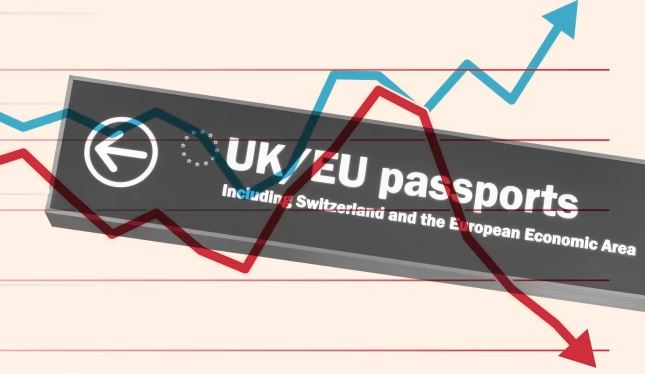The UK economy without immigration could stir long-term irrelevance on the global market. Overall, immigration absence might result in reduced competitiveness, demographic challenges, and labor shortages. Analysis indicates that the UK population could lag behind its innovation and economic growth peers.
UK Economy Without Immigration Overview
Recent forecasts have raised concerns since they indicate that the UK's economic growth relies on immigration. In general, the OECD (Organization for Economic Co-operation & Development) downgraded the UK’s economic growth from 0.7% to 0.4%. The UK population might lag behind the 2024 Eurozone collective economic growth of 0.7%.
Nonetheless, the UK population outpaces Germany's 0.2% economic growth prospects. Morgan Stanley’s Chief Economist, Jens Eisenschmidt, refers to the UK economic growth as ‘Europe but everything a little worse’. The 2022 budget crisis and persistent inflationary pressures are some challenges hampering the UK's economic performance.
Challenges Facing the UK Economy Without Immigration
The population of the United Kingdom voted for Brexit in 2016, raising concerns about attracting and integrating migrants into their workforce. Right now, the United Kingdom population is grappling with economic stagnation due to labor shortages.
- Labor Shortages
Youth unemployment and long-term sickness have resulted in economic inactivity. Yet, the country is struggling with a 3.4% inflation rate that surpasses the 2.4% in the Eurozone. The UK economy without immigration will likely forester labor shortages, impeding long-term recovery and growth.
- Aging Population
The aging UK population poses labor shortage threats, and increases pension & healthcare costs. Most developed European nations are grappling with aging, requiring immigration from younger countries to fill the labor market gap. Although immigration has risen since the Brexit vote, the UK plans to deport asylum seekers to Rwanda.
- Skill Gap

Britain boasts great educational institutions that attract immigration for brand value. In general, attracting migrants and incorporating them into the labor force is vital for economic growth prospects. But failure to fill up the skill gap can hinder long-term growth prospects, productivity, and innovation.
- Economic Stagnation
The Bank of England will likely initiate slower interest rate cuts than the European Central Bank to stimulate economic growth. Overall, economic stagnation hinders workforce participation, productivity, and GDP growth. It poses formidable concerns for businesses and policymakers due tough economic pressures.
UK Economy without Immigration Aftermath
The UK economy without immigration hinders growth due to inactivity trends, labor shortages, and persistent inflation. Overall, the United Kingdom population impacts market sentiments and results in currency volatility.
- Currency Volatility
The UK population faces currency volatility as investors are concerned with inflation and long-term growth uncertainties. In other words, immigration policy changes will impact inflation, interest rates, and currency markets. Labor shortages threaten the UK economic growth and pound value.
- Market Sentiments
Sectors reliant on migrant labor, such as agriculture, hospitality, healthcare, and tech, face acute challenges. In any case, limited access to talent hinders competitiveness, productivity, and innovation. It can result in higher operational costs and higher wage pressures to alter the profit margins in the capital markets.
Wrapping Up!
The UK economy without immigration could result in stagnation, skill gaps, and labor shortages. Overall, these challenges could alter market sentiments and cause currency volatility. The recent OECD economic growth projection mounts pressure on UK policymakers to navigate the challenges resulting from deportations to Rwanda.





